When customers fully understand how to use your product, they’re more likely to stay with you, see value in your offering, and become long-term advocates. That’s why customer training has become a vital part of many businesses’ growth and retention strategies. A well-executed customer education program reduces support requests, improves product adoption, and drives satisfaction. In competitive markets, it can become a powerful point of differentiation.
Customer learning builds loyalty, boosts retention, and enhances your company’s reputation by helping users succeed on their own terms. But to deliver that kind of experience at scale, you need the right tools. That’s where a customer learning management system (LMS) comes in.
Here, we explore 10 of the best customer education LMS platforms available today. We’ll also walk you through key features and considerations to help you choose the best customer training solution.
What is a customer education LMS?
A customer education LMS is an online learning platform that helps businesses deliver consistent, structured, self-paced learning experiences to their customers. While many LMS platforms are geared toward internal learners, such as employees, customer LMS platforms are designed for external users (customers).
These platforms help customers understand how to use your product, answer frequently asked questions, and in some cases, provide certifications.
Signs you could benefit from a customer education LMS
A customer LMS is for any business that wants to help customers succeed at scale. While learning management systems are often associated with SaaS companies, manufacturing, finance, and Internet of Things (IoT) providers, the benefits of an LMS extend to a wide range of businesses.
Here are five signs that investing in a customer education LMS could have a significant impact on your business:
Your support team is overwhelmed: If your customer service reps answer the same questions every day, especially the same “how do I…” questions, an LMS could reduce support tickets and free up your team for more complex issues.
Your current onboarding process is time-consuming or inconsistent: If your team is repeatedly delivering the same product walkthroughs or training sessions, or if customers have varying experiences based on their guides, automating onboarding may be the right call.
Customers churn before they see real value: If users churn quickly, without fully using your product or service, they may need more guidance from your organization. An LMS can help them better understand how to access your features and deepen their engagement.
You want to scale: Manual customer training doesn’t scale well. Anytime you add people, products, or services, your costs go up. An LMS scales without significantly impacting your resources.
You have clients across regions: It’s costly to help clients across the globe–and even across a country. A centralized training platform allows clients to access consistent training anytime, anywhere.
Benefits of a customer LMS
In addition to the numerous benefits a customer LMS has for your clients, there are many benefits for your organization.
Scalable and flexible learning solutions
No matter where in the world you have customers and clients, you can provide consistent training to them. You can make that training flexible by offering customized learning paths based on different customer segments. Additionally, you can tailor the training to meet individual customers’ learning needs and styles. Finally, by having an LMS that’s mobile responsive, learners can access your content from any device.
Enhanced customer engagement and satisfaction
Engaged customers are likely to be more loyal customers. Customer LMS platforms allow you to provide engaging and interactive learning experiences, including quizzes, videos, and gamification features to make learning more enjoyable. Offering opportunities for immediate feedback and support further enhances the experience.
Efficient content management
As your business grows and offers additional products and services, you’ll likely need to create more courses for your customers. Creating, storing, managing, and distributing that content quickly becomes complicated. An LMS provides a centralized content repository, making it easy to manage, update, and distribute training materials. Automations make the process even more efficient, so you can focus on more pressing matters.
Easier customer progress tracking
With manual training, it’s more difficult to track customer progress. A robust LMS provides analytics that allow you to track their progress, as well as engagement levels and completion rates. You can see exactly how customers interact with your training content. That means you’ll know which courses are hitting the mark (and which ones might need a refresh). Analytics like this help you better tailor your future content to meet customer needs.
Effective cost management
Costs associated with traditional, in-person training can quickly get out of hand. Consider the costs of things like venues, travel, printed materials, and salaries or fees for facilitators. With an LMS, those costs are significantly reduced or eliminated entirely. Depending on the pricing model, you won’t necessarily be charged for each new learner you add to the platform.
Features to look for in a customer LMS
Not all customer LMS platforms are created equal. While the ideal LMS for you depends on your organization’s unique needs, there are some key features you’ll want to consider when you evaluate an LMS.
Easy-to-navigate interface: Because your customers aren’t employees, they aren’t required to complete the training. If you make it too difficult for them, they’ll give up. Your user experience becomes critical in this situation. Choose a platform that’s intuitive, visually appealing, and easy to navigate. Remember that your customers may not be technologically inclined, so keep that in mind as you review platforms.
Personalized learning paths: Depending on the size of your business, you may have multiple customer segments, use cases, or product tiers. Offering different learning paths ensures they get the right content at the right time and don’t feel overwhelmed by irrelevant information.
Branding and white labeling: A solid customer LMS will offer customization options, including the ability to add your company’s branding. White labeling ensures your customers have a seamless experience that feels like an extension of your product or website.
Scalability: One of the main benefits of an LMS is its scalability, so make sure you choose an LMS that grows with you. This should include flexible pricing models, comprehensive infrastructure, and multi-language support.
Mobile compatibility: Learners need the freedom to learn when and where they are able, which doesn’t always mean sitting at a desktop computer. A mobile-friendly LMS or one with a native app gives them that flexibility.
10 best customer LMS platforms
1. Absorb
.jpeg)
G2 rating: 4.6 out of 5 (644 reviews)
Absorb LMS is an AI-powered, cloud-based LMS built to support both internal and external training needs. It’s a good fit for companies that need to educate employees, customers, and partners. With personalized learning paths and mobile responsiveness, it gives you the tools to create engaging experiences that actually drive results.
From day one, admins can build, manage, and deliver courses using various content formats, such as videos, PDFs, and SCORM files. The platform is built to scale and supports everything from compliance tracking to certifications.
Absorb makes it easy to deliver customer training that fits your current needs (and continues to grow alongside your business).
Key features of Absorb:
Reporting, analytics on business impact
Gen AI driven content creation based on existing product documentation
Multi tenancy
Custom UI, branding and white-labelling
Automated administration
OOTB integrations with CRM, customer success and marketing tools
Communities, Social learning and gamification
Personalization at scale
Ability to monetize on customer education
2. Thought Industries
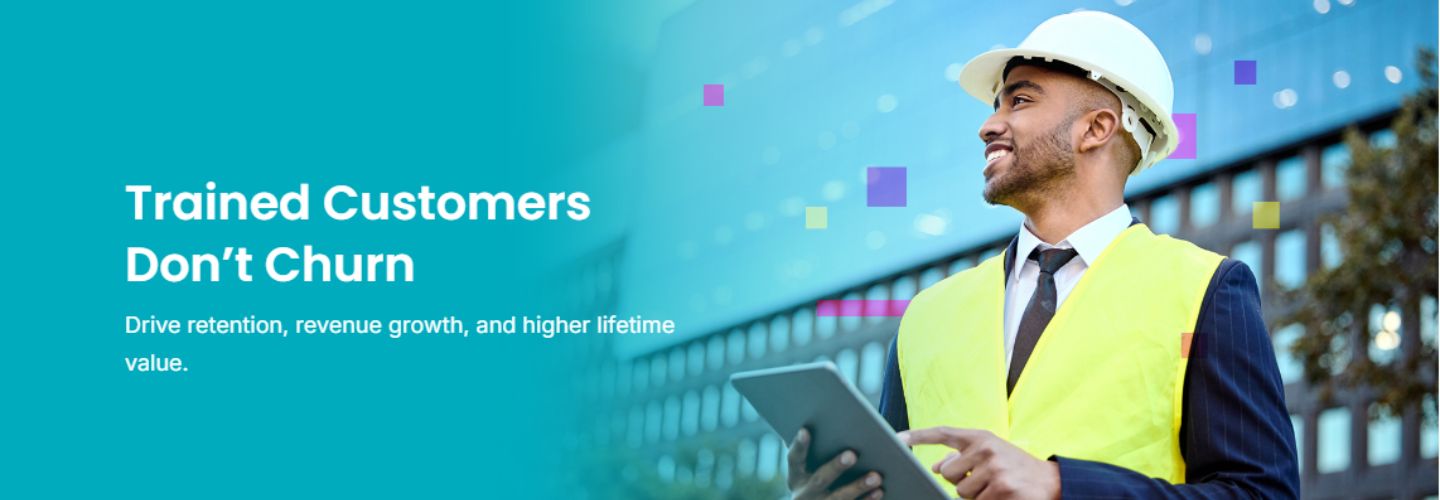
G2 rating: 4.1 out of 5 (161 reviews)
Thought Industries supports external training programs for customers and partners. Administrators can use built-in authoring tools to develop and manage content. The platform also supports the creation of customized learning paths and certifications. Thought Industries provides mobile-based learning, allowing users to access training materials across devices. Additionally, it offers robust reporting and analytics tools, enabling organizations to track learner progress and measure training program effectiveness.
Key features of Thought Industries:
Blended learning (self-paced and live instruction)
Cloud-based
Branding and white labeling
Gamification
Integrates with the organization’s help desk and customer community
Certifications and shareable badges
3. Skilljar/Gainsight
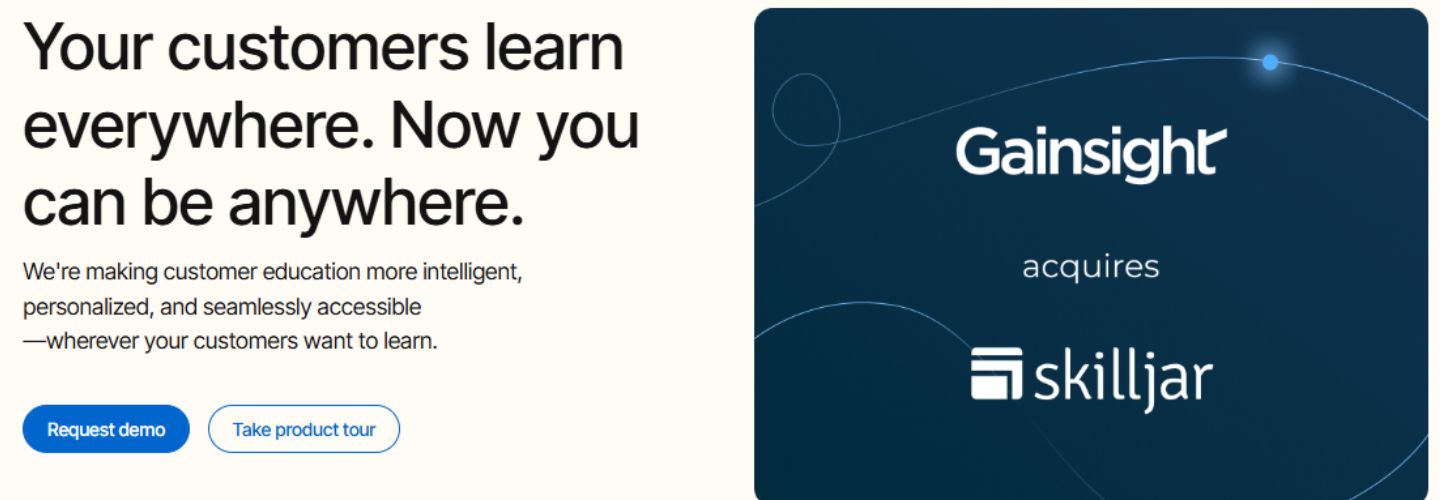
G2 rating: 4.6 out of 5 (210 reviews)
Skilljar is a customer education platform that was acquired by Gainsight in 2025. Skilljar’s designed to help organizations onboard, train, and engage external audiences. It supports content formats such as videos, PDFs, and SCORM files, allowing for diverse and engaging learning experiences.
Administrators can develop customized learning paths and provide certifications upon course completion. Skilljar is mobile-responsive, allowing users to access training materials across different devices. The platform provides analytics and reporting tools to track learner progress. It also enables eCommerce capabilities for organizations wanting to sell their training content.
Key features of Skilljar (Gainsight):
Built-in assessments and certifications
Automations and integrations (such as Zoom and Webex)
Content syndication
Pre-built insights, such as enrollments and completions
Product support specialists
4. LearnUpon
.jpeg)
G2 rating: 4.6 out of 5 (165 reviews)
LearnUpon is a cloud-based LMS that facilitates training for both internal and external audiences. It supports various content formats and allows administrators to create and manage courses tailored to diverse learning needs. Features such as customizable learning paths and certifications ensure that training programs are structured and goal-oriented. LearnUpon is mobile-responsive, allowing learners to access courses from different devices. To enhance engagement, LearnUpon offers gamification elements and blended learning approaches. It also offers multiple learning portals from one account, enabling organizations to train different customer segments or regional teams.
Key features of LearnUpon:
Options for white labeling
Integrations with third-party applications (such as Salesforce, webinar tools, and payment gateways)
Build courses without technical expertise
Reporting and analytics tools
5. Docebo
.jpeg)
G2 rating: 4.3 out of 5 (653 reviews)
Docebo emphasizes AI-powered learning and social learning tools. Similar to other LMS platforms, Docebo allows administrators to develop personalized learning paths and issue certificates upon completion. The platform uses AI-powered personalization to promote adaptive learning paths and suggest content based on user behavior. Manual tasks, such as customer enrollment, can be automated. Docebo’s platform can connect to the organization’s CRM and other success platforms for an integrated experience. Federated search reduces user reliance on the organization’s support teams. Meanwhile, social learning functionality allows users to share insights and upload content to deepen engagement.
Key features of Docebo:
Scalable through automated, targeted communication campaigns
eCommerce capabilities
Simplified program design
Content creation
Gamification
6. Litmos
.jpeg)
G2 rating: 4.3 out of 5 (630 reviews)
Litmos is used by a wide range of industries, with a focus on fast deployment, enabling users to implement training programs quickly. The platform offers a built-in library of off-the-shelf content, including training related to compliance, soft skills, and leadership. This content is useful for companies that lack the resources to create their own courses. Furthermore, Litmos offers AI-assisted tools and gamification features such as leaderboards and achievement badges to maintain learner engagement.
Key features of Litmos:
Social learning
Consistent branding
Automated emails
Single sign-on
Supports virtual and in-person instructor-led training
7. TalentLMS
.jpeg)
G2 rating: 4.6 out of 5 (779 reviews)
TalentLMS supports multiple training use cases. Blended learning and gamification features foster course engagement, while mobile responsiveness allows learners to access the platform from any device. Administrators can use the drag-and-drop interface to customize the customer experience. Plus, repetitive tasks like course management, user deactivation, and follow-up emails can be automated.
Key features TalentLMS:
Customized learning paths
Gamification
SCORM, cmi5 & xAPI compliant
Ecommerce support
Conforms to WCAG-2 accessibility requirements
Third-party integrations
8. WorkRamp
.jpeg)
G2 rating: 4.4 out of 5 (570 reviews)
WorkRamp offers AI-powered capabilities designed to enhance the learning experience and foster efficient course creation The unified platform helps organizations manage diverse learning programs, simplifying administration and creating a cohesive learning experience.
Key features of WorkRamp:
Cloud-based LMS and community platform
Centralized customer learning
Integration with third-party tools
Advocacy programs to foster brand champions
9. Cornerstone
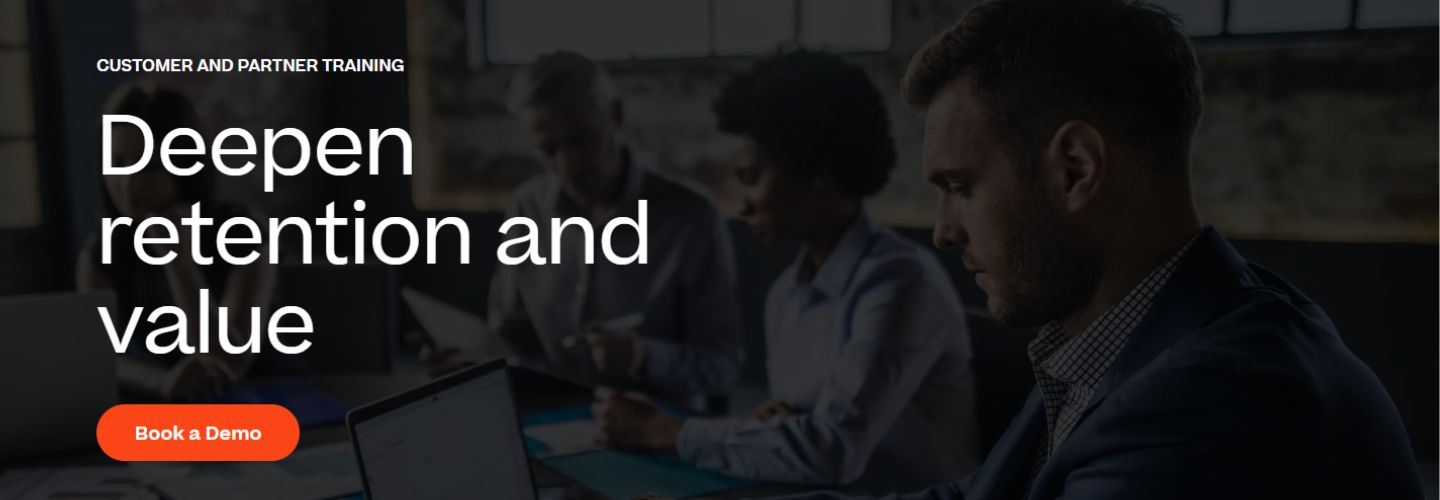
G2 rating: 4.1 out of 5 (513 reviews)
Cornerstone is a customer education LMS that helps you scale customer onboarding, deepen product knowledge, and drive customer success. The platform makes learning possible for a large audience of external users with personalization, engagement features, and mobile-friendly access.
Key features of Cornerstone:
Personalized learning paths
Integrations for CRMs and support platforms
Certification and gamification options to boost engagement
Automated training reminders
10. Tovuti LMS
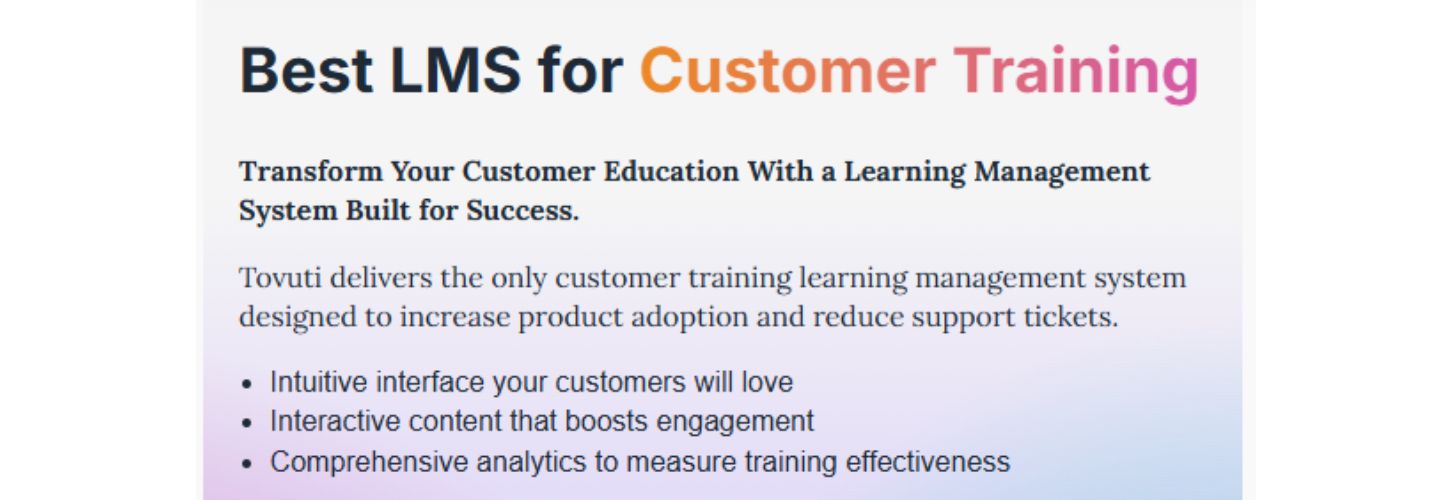
G2 rating: 4.6 out of 5 (292 reviews)
Tovuti LMS offers a comprehensive suite of tools that enable administrators to create, manage, and track learning activities. It offers over 40 interactive content options for engaging learning materials, gamification, customization, and mobile responsiveness.
Key features of Tovuti LMS:
Interactive content
Social content
Gamification
Import existing content
Customization and white label capabilities
Integration with third-party applications
Ready to see how the right customer LMS drives satisfaction and retention?
Product training is a powerful way to turn users into loyal advocates, and it's key to choosing a platform that aligns with your goals.
Absorb LMS offers everything you need to deliver effective, engaging, and scalable customer education. From personalized learning paths and intuitive design to detailed analytics and flexible customization, it’s built to support your success.
See how you can enhance your customer experience with an LMS for customer education.




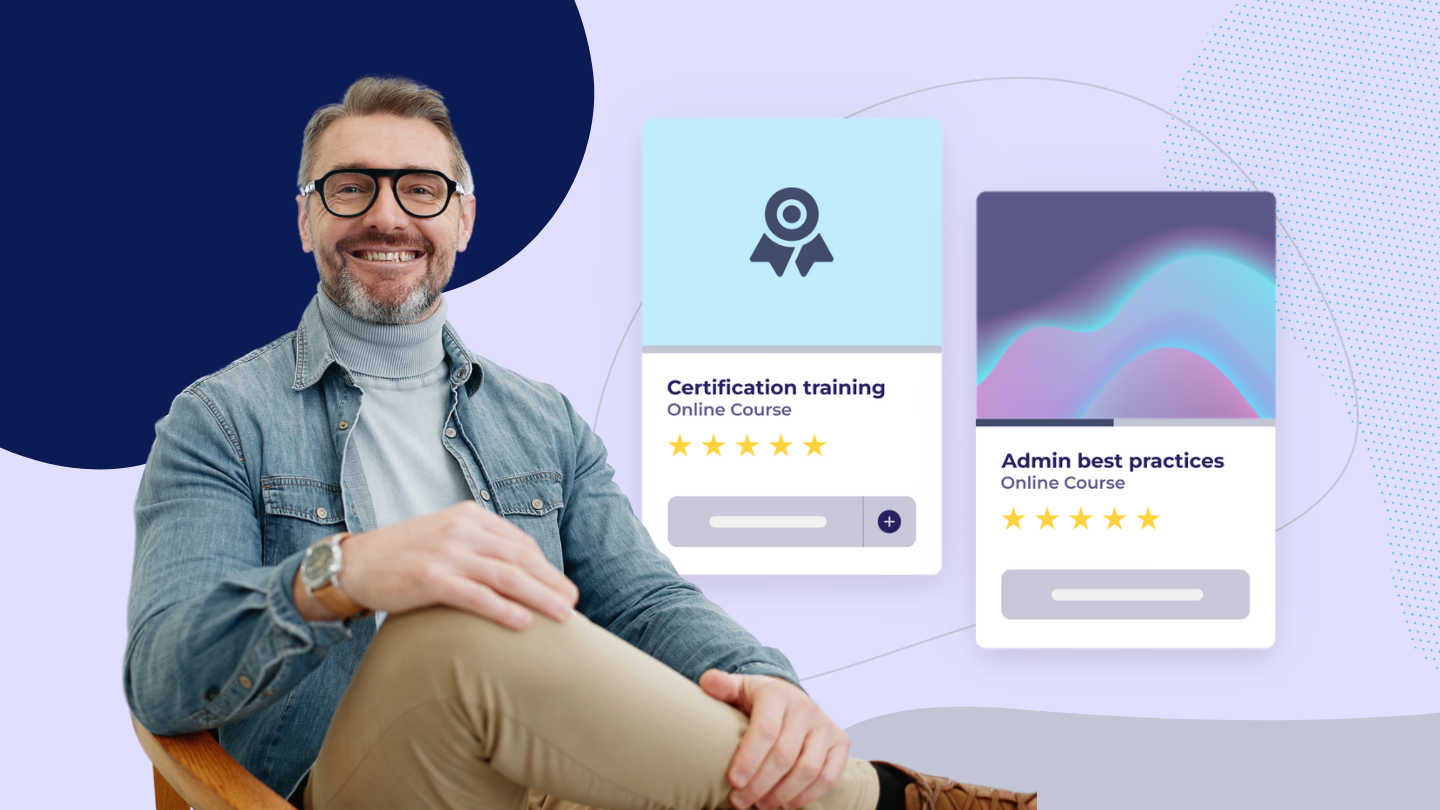


.avif)
_cardimg.avif)